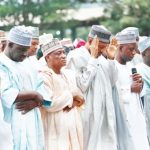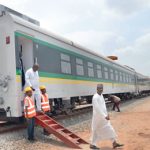A federal system or Federalism refers to the mixed or compound mode of government, combining a general government (the central or ‘federal’ government) with regional governments (provincial, state, cantonal, territorial or other sub-unit) in a single political system. To an extent, an individual state in such arrangement is independent and it could legislate over its own residual list – as provided for in a Constitution, while the central government legislates over the federal exclusive list. The two governments – at the centre and at the state levels – would legislate over the concurrent list.
Nigeria became a sovereign state on October 1, 1960. Civil leaders were ushered in under a federal system, but on January 16, 1966, there was an unprecedented military coup d’état which truncated the civil rule. With the emergence of uniformed men on the corridors of power, led by Gen. Aguyi Ironsi, there was the pronouncement that the country would no longer practice a federal system of government but a unitary one. A unitary state being one governed by a single power in which the central government is ultimately supreme and administrative divisions (sub-national units) exercised only the powers the central government choose to delegate to them. This was the case until Ironsi was overthrown and killed in another military coup on July 29, 1966.
The new set of dictators, led by General Yakubu Gowon, reversed the pronouncement and created 12 states on the eve of the Civil War. The nine-year Gowon administration witnessed huge volumes of oil production from the Niger Delta after the war. Again, that government was overthrown in another coup d’état. In between these coups was the reduction of the influence of state governments due to the long presence of military personnel at the helm of affairs, since the usual practice of military governments, whether it was federalism or the unitary system, was to have a central command centre which the subordinate states follow. Although we have left the unitary system, it seems to be only on paper as recent activities show that everyone still looks up to the centre for direction and funds.
Since oil was discovered in Oloibiri in the Niger Delta, the agriculture sector which requires a lot of labour engagement was gradually abandoned for the easier income from crude oil. Everyone became used to the national cake, and state governments found it more convenient to receive monthly allocations from the big brother at the centre rather than ensuring development through several engagements in agriculture, tourism, manufacturing, ICT, innovation and so on.
Unknown to us, year after year, the world was busy searching for substitutes for oil. It should be noted that global oil prices are susceptible to severe shocks due to several interests. Since our economy has been built on oil rent, we are now badly affected. It is common to see policy makers rant during price falls. In fact, political leaders, usually increase foreign trips to donors with begging bowls that leak due to ghost workers, corruption, an over-bloated civil service, heavy wage bills of public officials, amongst others.
Presently, our state governments are broke and can barely pay workers’ salaries, with 21 out of 36 states now owing at least four months’ salaries, and some owing up to seven months’ salaries. In the South West alone, four out of six states are on strike due to unpaid salaries. Only Lagos and Ogun States are exempted. The North-Central states are not different as only one state has a clean record of salary payment. In fact, the Benue State government has just extended the weekend by one day in order for civil servants to work for four days and farm for the three other days. The South-Eastern states have their fair share as three out of five states do not have a clean salary payment record. The oil rich region has also demonstrated lack, with two states including Bayelsa government claiming that it does not have enough to pay salaries. In the North-West and East, at least seven out of 13 states have salary backlogs.
We have recently seen state governments approach the Federal Government for bailout. However, six months after, the begging bowl seems to have been emptied. State governments are in another round of application for bailouts. Clearly, something is wrong. The begging bowl is leaking. Most of our states are not productive. Two-third of the states cannot internally generate 20 per cent of the allocations received from Federal Government according to the National Bureau of Statistics (NBS). They have poor IGR collection techniques characterised by a lot of leakages. States have to battle with their heavy payrolls for both civil and public servants. In most cases, no one remembers what is happening to infrastructure, as it is usually neglected.
Where did we go wrong and what is the way out? Rent seeking from oil revenue cannot save our nation. It comes with indolence and unwillingness to embark on genuine developmental programmes. It presents itself as free money. Thinking faculties often shut down when there is no need for competition and aspirations.
Governments across the country promised growth and development in coming into office, but much of the growth witnessed are those of joblessness. The fact is that we may not see genuine development if state governments keep running their programmes on the basis of federal allocations. The way forward would be fiscal independence – where states generate their fund and pay taxes to Federal Government. This will not only bring inclusive growth but also positive changes and healthy competition among states and regions. Until this is done, the poverty rate may remain 67 percent, and unemployment may remain in double digits. The job of the Federal Government would be to use fiscal policy to encourage regional development.
True federalism cannot be achieved without fiscal inclusion. To move forward as a nation, we must consciously build inclusive growth which guarantees jobs. States or regions and local governments must be the platforms for income generation and policy direction. The Federal Government should receive lifelines from its components and not vice-versa (particular in terms of revenue generation). With these, politicians without plans for genuine development will stay off public office. If they find their way in by hook or crook, I am sure their people will not return them to office. This is because the power of the people is stronger than the people in power.
- Alaje, an economist, can be reached via p.alaje@spmprofessionals.com
WATCH TOP VIDEOS FROM NIGERIAN TRIBUNE TV
- Relationship Hangout: Public vs Private Proposals – Which Truly Wins in Love?
- “No” Is a Complete Sentence: Why You Should Stop Feeling Guilty
- Relationship Hangout: Friendship Talk 2025 – How to Be a Good Friend & Big Questions on Friendship
- Police Overpower Armed Robbers in Ibadan After Fierce Struggle






